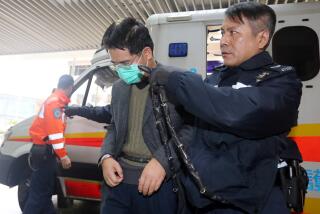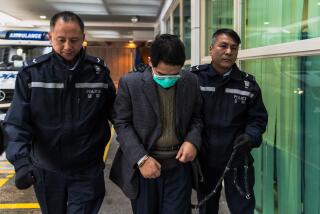Chinese mining tycoon, brother accused of mafia-style crimes
- Share via
BEIJING — A Chinese mining tycoon, his brother and 34 others who allegedly terrorized parts of Sichuan province for 20 years through a mafia-style gang were charged Thursday with murder, weapons trafficking and other offenses.
The case, centered on former Hanlong Mining chairman Liu Han and his younger brother, Liu Wei, was touted by state-run media as an example of how authorities are cracking down on corruption.
Since formally assuming China’s presidency a year ago, Xi Jinping has made rooting out graft a top priority, and the case against the Liu brothers — said to have illegally amassed a fortune worth more than $6 billion in businesses including mining, real estate and electricity — is among the biggest to date. Other recent campaigns in southern China have targeted large prostitution rings and a village known as the nation’s methamphetamine capital.
But the extensive details about the Liu brothers’ case offered up by state-run media again raised questions about just how such a criminal network, if it did exist as described, was allowed to grow so large and avoid prosecution for so long. Several of the suspects worked for the local police or prosecutor’s offices, but the case was reportedly investigated at the behest of central Communist Party authorities.
“The news of the prosecutions has sent tremors through Sichuan’s political and business circles, many of whom never suspected that such a huge network could be targeted,” the official New China News Agency said, somewhat awkwardly, in its lengthy report.
The charges were brought in Hubei province, east of Sichuan.
Among the surprising morsels presented in the state-run media was that police who busted the gang reportedly recovered 20 guns, more than 600 bullets, more than 2,100 shotgun cartridges and more than 100 knives, plus three grenades.
A 30-minute segment on the case broadcast on state-run CCTV showcased rows of bullets, plus a garage full of luxury vehicles said to belong to the Liu gang, including Bentleys, Ferraris, Range Rovers and Mercedes-Benzes.
The CCTV report included incriminating taped statements with a number of the accused in custody, including Liu Han’s ex-wife and Liu Wei himself, who recounted paying off people with parties and gifts.
According to the news agency, Liu Han and his brother “first attracted attention” in 2009, when hired hit men gunned down three men in a tea house in broad daylight in downtown Guanghan. The gunmen, subsequently arrested, reportedly told authorities that the Lius had commissioned the killings.
The Lius were well-known and well-connected. Liu Han was a member of the advisory body to the Sichuan provincial government, and he had a reputation as a generous philanthropist. After the 2008 Sichuan earthquake, he was touted because a rural school that he had funded survived the temblor when scores of others shoddily constructed by the government collapsed.
Liu Wei was also known for his business and charity work, and even served as a torch-bearer in the 2008 Summer Olympics flame relay.
But the Lius, the news agency said, had actually begun their campaign of intimidation and thuggery in the early 1990s, when they ran a gambling operation. They expanded into other businesses, reportedly killing off rival gang bosses and others who got in the way of their plans.
The high-profile takedown of the Liu brothers sparked speculation about the political forces at work behind the scenes.
“Liu Han’s political ties were so deep, he could kill the whole family of [one man]. But now, the political forces that brought Liu down are much stronger,” said one observer named Jisiliu, commenting on the case online. “Liu Han is sure to be dead this time.”
The investigation into the Lius has rippled beyond China’s shores to mining business on several continents, including Australia, where Hanlong is a major shareholder in several mines, and the United States.
American molybdenum mining company General Moly said last March it was suspending a deal with Hanlong for a $665-million loan to develop a large project in Nevada because of reports that Liu Han had been detained in China.
Thursday’s news of the case against Liu Han and the 35 others comes about a month after rumors surfaced in the Australian media that he might have been secretly put to death while in Chinese custody. Some speculated that he had run into trouble because some of his investments were bankrolled with state money but were performing poorly.
Twitter: @JulieMakLAT
Tommy Yang in the Times’ Beijing Bureau contributed to this report.
More to Read
Sign up for Essential California
The most important California stories and recommendations in your inbox every morning.
You may occasionally receive promotional content from the Los Angeles Times.











